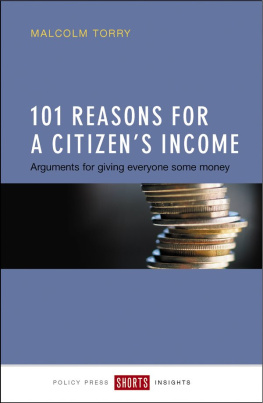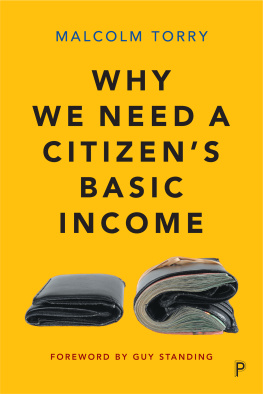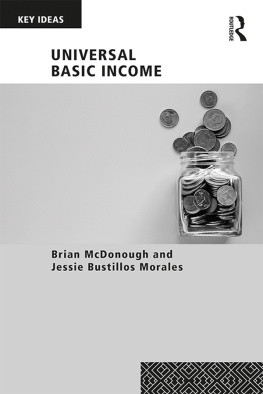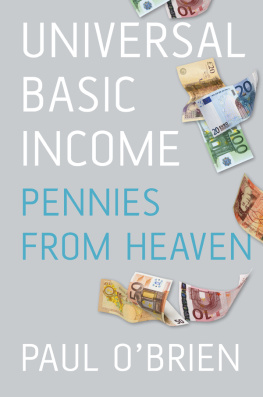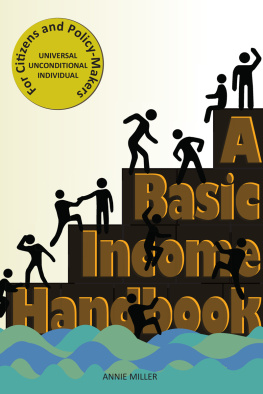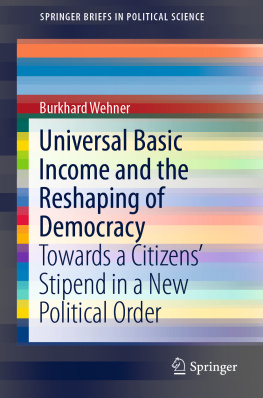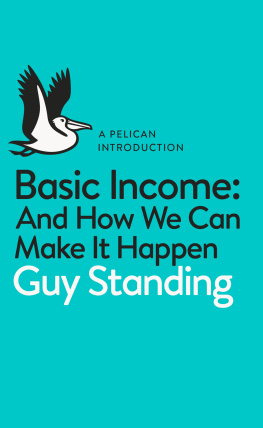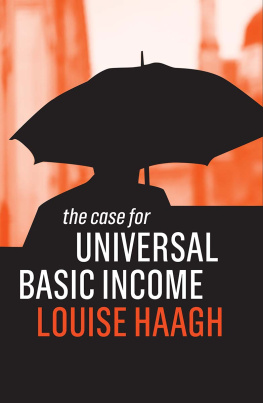MALCOLM TORRY
101 REASONS FOR A CITIZENS INCOME
Arguments for giving everyone some money
First published in Great Britain in 2015 by
Policy Press University of Bristol 1-9 Old Park Hill Bristol BS2 8BB UK Tel +44 (0)117 954 5940 e-mail
North American office: Policy Press c/o The University of Chicago Press 1427 East 60th Street Chicago, IL 60637, USA t: +1 773 702 7700 f: +1 773-702-9756 e:
Policy Press 2015
British Library Cataloguing in Publication Data
A catalogue record for this book is available from the British Library.
Library of Congress Cataloging-in-Publication Data
A catalog record for this book has been requested.
ISBN 978-1-4473-2612-0 (paperback)
ISBN 978-1-4473-2614-4 (ePub)
ISBN 978-1-4473-2615-1 (Mobi)
The rights of Malcolm Torry to be identified as the author of this work has been asserted by him in accordance with the Copyright, Designs and Patents Act 1988.
All rights reserved: no part of this publication may be reproduced, stored in a retrieval system, or transmitted in any form or by any means, electronic, mechanical, photocopying, recording, or otherwise without the prior permission of Policy Press.
The statements and opinions contained within this publication are solely those of the author and not of the University of Bristol or Policy Press. The University of Bristol and Policy Press disclaim responsibility for any injury to persons or property resulting from any material published in this publication.
Policy Press works to counter discrimination on grounds of gender, race, disability, age and sexuality.
Cover design by Andrew Corbett
Front cover: image kindly supplied by Getty
Readers Guide
This book has been optimised for PDA.
Tables may have been presented to accommodate this devices limitations.
Image presentation is limited by this devices limitations.
This book is dedicated to past and present trustees of the Citizens Income Trust, and to all of those who have done so much to keep alive the debate on the desirability and feasibility of a Citizens Income.
Acknowledgements
I continue to be enormously grateful to all those who have stimulated my interest in the UKs benefits system, and in a Citizens Income as a feasible and desirable way of reforming it. I will not repeat here the list of names to be found in the acknowledgements at the beginning of Money for Everyone, except to say that in the context of this present book I continue to be most grateful to the trustees of the Citizens Income Trust with whom I continue to work happily as honorary Director; to the Social Policy Department at the London School of Economics, and particularly to Professor Hartley Dean, for appointing me to a second period as a Senior Visiting Fellow from 2013 to 2015; to Emily Watt and her colleagues at the Policy Press for their help and encouragement; and to Professor Jay Ginn for reading a draft of this book with considerable diligence, and for offering suggestions that were both detailed and helpful. Needless to say, any mistakes are entirely the authors responsibility.
All royalties from this book will be donated to the Citizens Income Trust.
Preface
It might seem strange to suggest that we should give to every citizen a sum of money every week, but this book offers a hundred and one good reasons for doing it.
The regular weekly income for which I offer so many reasons goes by a variety of names Citizens Income, Basic Income, Citizens Basic Income, Universal Basic Income. They all mean the same thing: an unconditional and non-withdrawable income paid automatically to every individual as a right of citizenship.
By unconditional we mean that the amount of Citizens Income that someone receives would not be affected by employment status, by other income, by household structure, by gender, by marital status, or by anything else. The amount of Citizens Income would vary with the age of the recipient with children receiving less than working age adults, and older people more but every individual of the same age would receive exactly the same amount every week.
By non-withdrawable we mean that if someone began to earn an income, or their earned or other income rose, then their Citizens Income would not change.
Here I must add a note about the term Citizens Income scheme. A Citizens Income is an unconditional and non-withdrawable income for every individual. That definition never alters, and if an income does not fit that definition then it is not a Citizens Income. A Citizens Income scheme is a Citizens Income, along with the age thresholds chosen and the amounts of Citizens Income for each age group, and also the changes made to tax and benefits systems when the Citizens Income is implemented. There will therefore be numerous different kinds of Citizens Income scheme.
At least since Thomas Paine wrote his Agrarian Justice the idea of a Citizens Income has appeared about once a generation and then fallen back into obscurity. In 1984, following an increase in interest in the Citizens Income idea in a variety of European countries, a group of people came together to form the Basic Income Research Group in order to promote debate on the idea of a Citizens Income so that it would not disappear from view and there would be a more solid basis for discussion when it re-emerged. The Europe-wide and now global organisation Basic Income Earth Network (BIEN) soon followed. The Basic Income Research Group is now the Citizens Income Trust, and now that we are a generation from 1984 we are pleased to see the expected renewed interested in Citizens Income schemes. In the UK the Green Party has recommitted itself to establishing a Citizens Income; we have seen increasing interest in the press and social media; and a variety of campaigning groups have emerged. Elsewhere, Namibia and India have experienced successful pilot projects, Switzerland is soon to hold a referendum on whether the country should establish a Citizens Income, and academic and policy-maker interest is evident around the world.
Because a Citizens Income would positively serve our economy and society in a variety of ways, and because our current benefits system is no longer appropriate to our society or to its economy, we need to grasp this moment of opportunity to promote widespread debate about the desirability and feasibility of a Citizens Income and then to implement it.
It is for this reason that I wrote Money for Everyone: Why we need a Citizens Income, and that the Policy Press published it in 2013. Money for Everyone is a thorough, evidence-based discussion of the desirability and feasibility of a Citizens Income, and it serves well as an introduction to the subject. The book is both accessible and academically rigorous, but some of those who have read it have asked whether I might write a further book shorter, even more accessible in style, and suitable for stimulating initial interest in the subject. This is that new book.
In the cause of accessibility and brevity I have kept notes and references to a minimum. Anyone who wishes to pursue a particular argument, or to discover the evidence for it, should easily find relevant material by using the comprehensive indexes in Money for Everyone. Only where a quotation needs to be referenced, or where no reference to a source will be found in Money for Everyone, will an endnote be found. No index is provided because the detailed contents page will take the reader to passages relevant to their interests. Because the book might be used in this way I have tried to ensure that each reason is self-contained: that is, readers will not need to refer to other parts of the book in order to understand the reason that they are reading. Because the same logic, or the same evidence, might underlie more than one reason for a Citizens Income, the reader who reads the book all the way through will notice a certain amount of repetition. Take, for instance, the marginal deduction rate: the total rate at which income taxes and withdrawal of means-tested benefits reduces disposable income as earnings rise (the deduction rate is marginal in the sense that it is the rate at which
Next page
